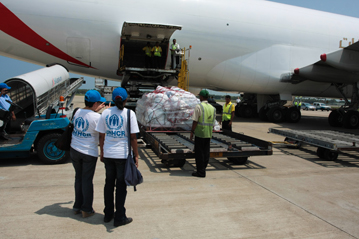"Model" agreement reached on Afghan returns from the UK
"Model" agreement reached on Afghan returns from the UK

KABUL, Afghanistan, October 14 (UNHCR) - The UN refugee agency has signed an important Memorandum of Understanding with the British and Afghan governments, which together with a similar agreement signed with the French government recently, could become a model for other countries interested in the voluntary repatriation and reintegration of Afghans.
The latest tripartite agreement was signed in Kabul on Saturday, October 12, between Enayatullah Nazeri, Afghanistan's Minister for Refugees and Repatriation; Mike O'Brian, a British Foreign and Commonwealth Office Minister; and Filippo Grandi, chief of UNHCR's Afghanistan operation.
"UNHCR welcomes this agreement, which is the second in a series, unprecedented in UNHCR's history," said Grandi after the signing ceremony. "We are happy about this agreement, because it will govern the return of Afghans from the United Kingdom in a manner that is humane, gradual and orderly. It also takes into account the protection needs of individual Afghans and the problems of absorption in Afghanistan."
Afghan minister Nazeri added, "I'm pleased to have signed this agreement. This is very good news for us. This agreement not only brings the two nations together, but also benefits the Afghans who wish to return."
British minister O'Brian agreed: "I am delighted to have reached an agreement. This will strengthen the relations between the two governments."
A similar tripartite agreement - the first involving a country outside the immediate region - was signed by Afghanistan's Nazeri, French Interior Minister Nicolas Sarkozy and UNHCR in Paris on September 28.

Under both the French and UK agreements, all Afghans currently in either country - regardless of status - can benefit from a voluntary repatriation package (although precise terms vary according to their status and, in the case of the UK, how recently they arrived). The emphasis is on voluntary repatriation, although the agreements also recognise that Afghans who are not recognised as refugees and who are without current protection needs or other humanitarian concerns, can legitimately be returned "in a closely co-ordinated, phased and humane" process after the end of winter. The repatriations from both countries will comply with the 1951 Convention and its 1967 Protocol.
Other priorities of both agreements are to safeguard family unity, and to provide special arrangements for vulnerable groups, especially unaccompanied minors.
The agreements state that UNHCR will provide information and counselling to the Afghans in both countries to ensure that any decision to return is "taken in full knowledge of the facts". The agency will also monitor the voluntariness of return before departure, and have immediate access to returnees once they land at the airport in Afghanistan.
For their part, the British and French governments will offer generous financial packages, and pay for the transport of the Afghans and their personal belongings home. They will also provide medical check-ups and the necessary vaccinations prior to departure. In addition, they will consider funding a range of reconstruction and rehabilitation projects in Afghanistan, including employment-generating programmes in areas of return.
In turn, the Afghanistan government will re-admit its nationals, taking the necessary measures to ensure that they can return without any fear of harassment, discrimination or persecution. It will recognise changes in their legal status - including marriages, divorces, births, adoptions and deaths - and permit their non-Afghan spouses and children to stay in the country. Returnees will be guaranteed freedom to settle in their former place of residence or "any other place of their choice in Afghanistan".
Raymond Hall, director of the UN refugee agency's Europe Bureau, said in Geneva that UNHCR hoped that other countries that were interested in offering assisted voluntary repatriation for Afghans would use the French and British agreements as a model.









